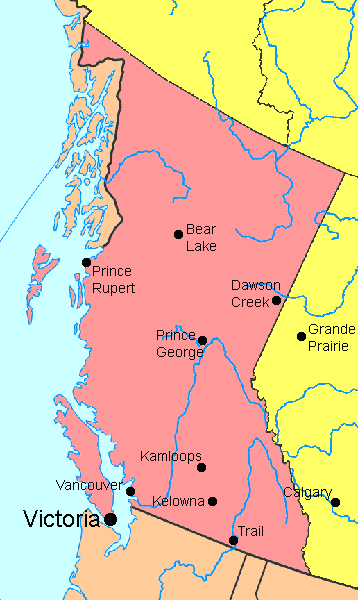|
British Columbia
British Columbia, or simply B.C. (French: la Colombie-Britannique) is the westernmost of Canada's provinces. It was the sixth province to join Confederation (in 1871). As of 2004, the population was 4,168,123 (British Columbians). From 1818 to 1846, British Columbia south of 54°40' and west of the Rocky Mountains was part of the Oregon Country. The land was under the control of the Hudson's Bay Company, and was divided into the departments of Columbia (south of the Columbia River) and New Caledonia (north of the river). In 1846, the Oregon Treaty divided the territory along the 49th parallel to Georgia Strait, with the area north of this boundary (and all of Vancouver Island) becoming exclusively British territory. Vancouver Island became a Crown colony in 1849. In 1858, in response to the Fraser Canyon gold rush, the mainland portion of the former Oregon Country was organized into the colony of British Columbia. The Cariboo region ("Central Interior") of British Columbia experienced a gold rush in the years 1862 to 1865. This created a rapid influx of miners and settlers, about 30,000 in all. The colonial authorities feared the gold rush might spread beyond B.C.'s northern border (54°40' north), so the Stikine Territory was created in 1862. However, the following year this new territory was disestablished, most of its area going to B.C., whose northern limit was increased to its current location, 60° north. This period in the province's history is acknowledged today in the Gold Rush Trail: historic and other sites along the route from Lillooet to Barkerville and beyond. Some of the towns along this route are numbered according to their distance from the end of the navigable part of the Fraser River at Lillooet. Best known of these is the town of 100 Mile House which, along with the residential hub of 108 Mile Ranch, forms a substantial trading, tourism, and population centre for this region. After the mainland's gold rushes collapsed and the colony almost went bankrupt from building roads in its interior, the two colonies of Vancouver Island and British Columbia agreed to merge and share the debt. The merger was effected in 1866, with the name British Columbia being applied to the newly united colony. Several factors played in the decision of British Columbia to join Canada on 1871 July 20. These included fear of annexation to the United States, the overwhelming debt created by rapid population growth, the need for government-funded services to support this population, and the economic depression caused by the end of the gold rush. The decision was made largely because the Canadian government offered to link British Columbia to the more settled parts of Canada via the Canadian Pacific Railway and offered to pay off the $1,000,000 British Columbian debt. The completion of the CPR was a huge boost to Vancouver, the line's terminus, and it rapidly grew to become one of Canada's largest cities. The province became a centre of fishing, mining, and especially of logging throughout the twentieth century. In 1907, British Columbia's territory shrank somewhat after the Alaska Boundary Dispute awarded part of northwestern B.C. to the United States. British Columbia . has long taken advantage of its Pacific coast to have close relations with East Asia. However, this has caused friction, with frequent feelings of animosity towards Asian immigrants. This was most manifest during the Second World War when many people of Japanese descent were interned in the interior of the province. The post-World War II years saw Vancouver and Victoria also become cultural centres as poets, authors, artists, and musicians flocked to the beautiful scenery and warmer temperatures. Tourism also began to play an important role in the economy. The rise of Japan and other Pacific economies was a great boost to the B.C. economy. |
|||||||||||
